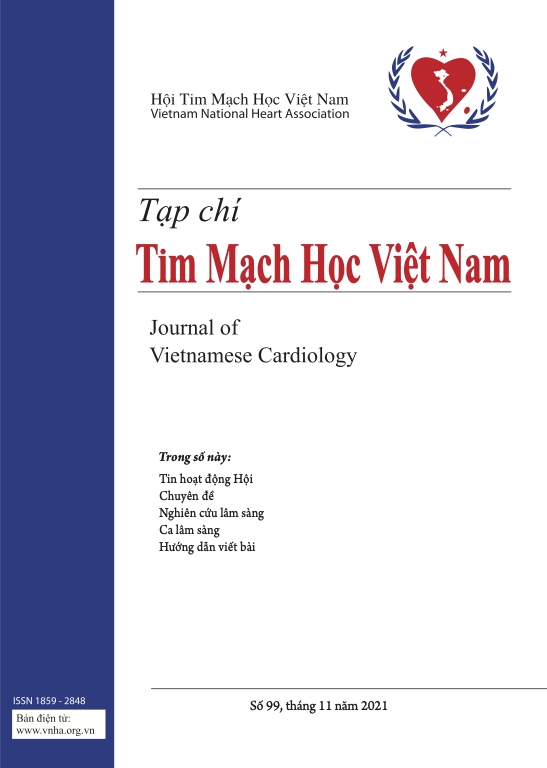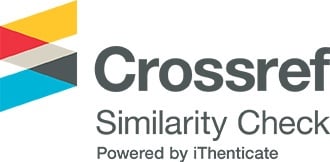Tác động của đại dịch COVID-19 lên sức khỏe tâm thần ở người bệnh có bệnh lý tim mạch
DOI:
https://doi.org/10.58354/jvc.105.2023.456Từ khóa:
COVID-19, trầm cảm, căng thẳng, lo âu, bệnh lý tim mạchTóm tắt
Mở đầu: COVID-19 là một bệnh lí đường hô hấp cấp tính truyền nhiễm, có thể dẫn tới tổn thương nhiều cơ quan trong cơ thể. Đồng thời do tính chất dễ lây nhiễm của bệnh, cần sử dụng các biện pháp cách li trong điều trị, nên đại dịch COVID-19 cũng có khả năng gây ảnh hưởng đáng kể tới sức khỏe tâm thần của người bệnh.
Mục tiêu: Đánh giá tác động của đại dịch COVID-19 đến điểm số sức khỏe tâm thần của bệnh nhân tại Trung tâm Tim mạch, Bệnh viện Đại học Y Hà Nội.
Đối tượng và Phương pháp: Nghiên cứu mô tả cắt ngang, sử dụng hai thang đánh giá tâm lý: Thang đánh giá tác động của sự kiện (IES-R: Impact of Event Scale -Revised) và Thang đánh giá Lo âu – Trầm cảm – Stress (DASS 21: Depression, Anxiety and Stress Scale-21 items) đối với bệnh nhân điều trị nội trú tại Trung tâm Tim mạch, bệnh viện Đại học Y Hà Nội từ tháng 5/2022 đến tháng 7/2022.
Kết quả: Nghiên cứu thực hiện trên 130 bệnh nhân. Có 15,4% người tham gia có vấn đề sức khỏe tâm thần cần quan tâm liên quan đến đại dịch COVID-19. Trong số này có 6,9% bệnh nhân bị căng thẳng mức độ từ trung bình đến nặng. Có 19,2% người tham gia có nguy cơ trầm cảm; 32,3% người tham gia có nguy cơ lo âu; 26,1% có nguy cơ bị căng thẳng. Có mối tương quan chặt chẽ giữa điểm sức khỏe tâm thần và giới tính, tuổi tác, nghề nghiệp, chẩn đoán y khoa, bệnh nền, mức độ nghiêm trọng của bệnh COVID-19, và những thay đổi trong thói quen sinh hoạt hàng ngày.
Kết luận: Nhóm đối tượng nghiên cứu bị tác động tâm lý bởi đại dịch COVID-19 và có nguy cơ mắc các vấn đề về sức khỏe tâm thần. Bệnh nhân tim mạch đặc biệt cần được sàng lọc và thăm khám chuyên sâu về sức khỏe tâm thần vì đã có các bằng chứng về ảnh hưởng của chúng đối với quá trình bệnh tim.
Tài liệu tham khảo
Organization, W.H. Cardiovascular Diseases. WHO. 2019.
![]()
Hillary Ta, B.S., Bryant Lin, M.D., and Latha Palaniappan, M.D., M.S, Vietnamese and Vietnamese-American Health Statistics, 2003-2019. 2020.
![]()
Nishiga, M., et al., COVID-19 and cardiovascular disease: from basic mechanisms to clinical perspectives. Nat Rev Cardiol, 2020. 17(9): p. 543-558.
![]()
Hare, D.L., et al., Depression and cardiovascular disease: a clinical review. Eur Heart J, 2014. 35(21): p. 1365-72.
![]()
Rugulies, R., Depression as a predictor for coronary heart disease. a review and meta-analysis. Am J Prev Med, 2002. 23(1): p. 51-61.
![]()
Eng, H.S., et al., Anxiety and depression in patients with coronary heart disease: a study in a tertiary hospital. Iran J Med Sci, 2011. 36(3): p. 201-6.
![]()
Bordoni, B., et al., Depression and anxiety in patients with chronic heart failure. Future Cardiol, 2018. 14(2): p. 115-119.
![]()
Augusto V., et al., Prevalence of anxiety and depression in patients with cardiovascular diseases during the COVID-19 pandemic. Argentine Federation of Cardiology, 26 June 2020.
![]()
Wang C, P., et al. Immediate psychological responses and associated factors during the initial stage of the 2019 coronavirus disease (COVID-19) epidemic among the general population in China. Int J Environ Res Public Health. 2020;17(5). doi:10.3390/ijerph17051729.
![]()
Gonzalez Ramirez, L.P., et al., Psychological Distress and Signs of Post-Traumatic Stress in Response to the COVID-19 Health Emergency in a Mexican Sample. Psychol Res Behav Manag, 2020. 13: p. 589-597.
![]()
Wang, C., et al., The impact of COVID-19 pandemic on physical and mental health of Asians: A study of seven middle-income countries in Asia. PLoS One, 2021. 16(2): p. e0246824.
![]()
Hanssen TA, N., et al., Anxiety and depression after acute myocardial infarction: an 18-month follow-up study with repeated measures and comparison with a reference population. Eur J Cardiovasc Prev Rehabil. 2009;16:651–9.
![]()
Moraska AR, C., et al., Depression, healthcare utilization, and death in heart failure: a community study. Circ Heart Fail. 2013;6:387–94.
![]()
Lim SL, W., et al., Impact of COVID-19 on health-related quality of life in patients with cardiovascular disease: a multi-ethnic Asian study. Health Qual Life Outcomes. (2020) 18:387. doi: 10.1186/s12955-020-01640-5.
![]()
Chagué F, B., et al., Impact of lockdown on patients with congestive heart failure during the coronavirus disease 2019 pandemic. ESC Heart Fail. (2020) 7:4420–3. doi: 10.1002/ehf2.13016.
![]()
Bayani B, Y., et al., Depression and anxiety in a cardiovascular outpatient clinic: a descriptive study. Iran J Psychiatry. 2011;6:125–7.
![]()
Allabadi, H., et al., Depression and anxiety symptoms in cardiac patients: a cross-sectional hospital-based study in a Palestinian population. BMC Public Health, 2019. 19(1): p. 232.
![]()
Journiac J, V., et al., What Do We Know About Young Adult Cardiac Patients' Experience? A Systematic Review. Front Psychol. 2020 Jul 7;11:1119. doi: 10.3389/fpsyg.2020.01119. PMID: 32733301; PMCID: PMC7358619.
![]()
Vaccarino V, B., et al., Behavioral, emotional and neurobiological determinants of coronary heart disease risk in women. Neurosci Biobehav Rev. 2017 Mar;74(Pt B):297-309. doi: 10.1016/j.neubiorev.2016.04.023. Epub 2016 Aug 2. PMID: 27496672; PMCID: PMC5290226.
![]()
Celano, C.M., et al., Anxiety Disorders and Cardiovascular Disease. Curr Psychiatry Rep, 2016. 18(11): p. 101.
![]()
Easton K, C., et al., Prevalence and measurement of anxiety in samples of patients with heart failure: meta-analysis. Cardiovasc Nursing. 2015 doi:10.1097/JCN.0000000000000265.
![]()
Ingibjörg M., et al., Acute COVID-19 severity and mental health morbidity trajectories in patient populations of six nations: an observational study. 2021
![]()
Catherine P., et al., Depression, Anxiety, and Acute Stress Disorder Among Patients Hospitalized With COVID-19: A Prospective Cohort Study. 2019.
![]()








